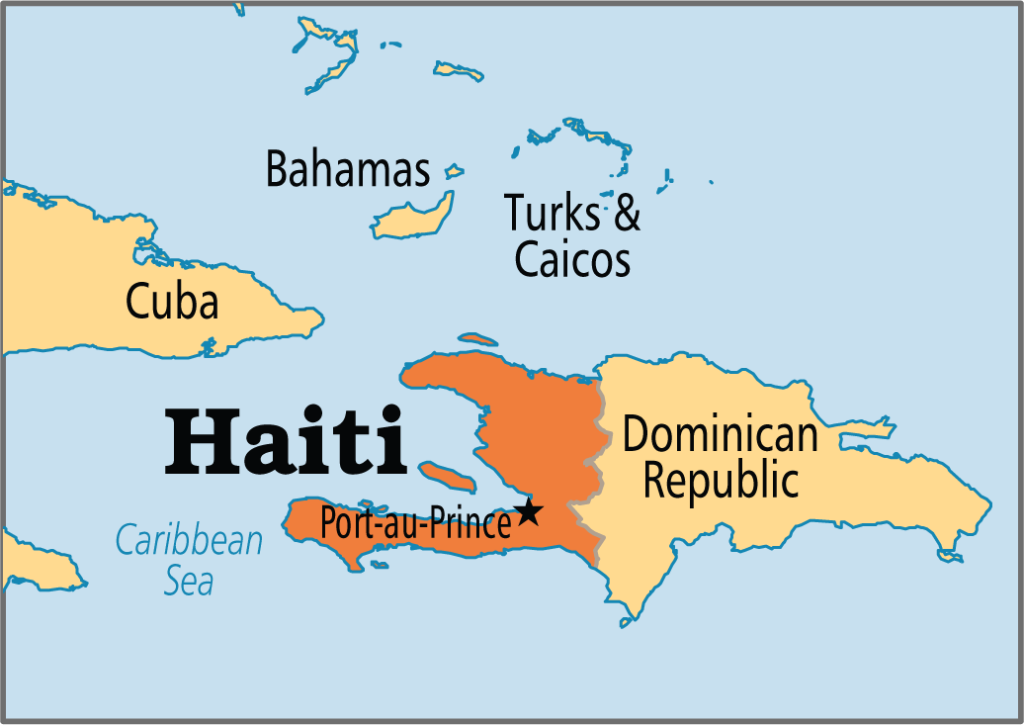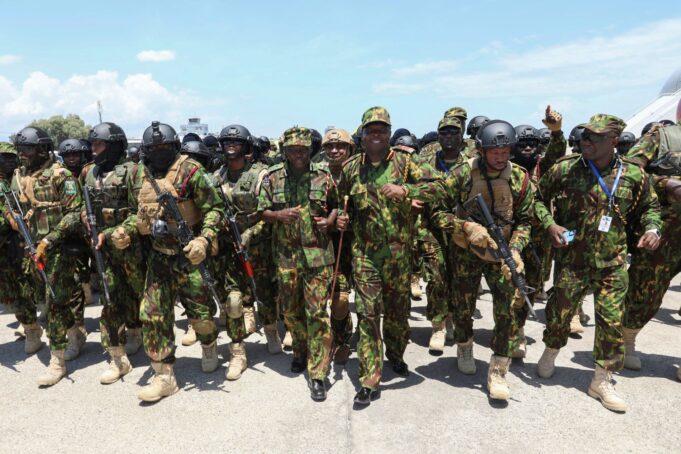Among Haitians, mixed feelings and controversy surrounds the arrival of 200 highly militarized police from the East African country of Kenya, under the guise of aiding the Haitian National Police quell incessant violence of “gangs” wreaking havoc since earlier this year.
The July 16 arrival was the second contingent of 200 Kenyan police that is expected to cap at 1,000. The first group disembarked at the Toussaint L’Ouverture Airport in Haiti’s capital, Port-au-Prince, in late June.
The U.S. funded mission was voted on last October by a United Nations Security Council resolution. Considered neither a U.S. nor UN mission, the Multinational Security Support Mission (MMSS) is expected to expand with forces from the Bahamas, Bangladesh, Barbados, Benin, Chad and Jamaica. The new mission will seek to protect state institutions, critical infrastructure, transport hubs, and counter armed groups.
“I will not allow these gangs to continue to hold the population hostage in Port-au-Prince, Artibonite, or in any other place in the country,” said Garry Conille, Haiti’s new Interim Prime Minister.
“Security in the country is one of the fundamental points for the democratic transition,” he said.
Mr. Conille declared a “state of security emergency” in 14 municipalities badly affected by armed “gangs” so the Haitian and Kenyan police can act to restore security and stability.

He gave the remarks in a nationally televised address on July 17, one day after the second group of Kenyans arrived. Mr. Conille, a former UN development specialist, replaced Haiti’s deeply unpopular Acting Prime Minister Ariel Henry, who was appointed to the position and widely seen as illegitimate by opponents. Mr. Henry resigned in April under political duress after a Transitional Presidential Council, brokered by Washington and the Caribbean Community (CARICOM) was formed. The council consists of a cross-section of Haitian stakeholders selected to govern Haiti until elections can be convened—and a president inaugurated—by February 2026.
“They’ve got about an 18-to-20-month window … to regain control of the streets. Create a climate, which would build enough confidence on the part of people so that you can have real, free and fair elections,” said Jocelyn McCalla, senior policy advisor for the Haitian-American Foundation for Democracy.
An already troubled nation that descended further after the assassination of its president, Jovenel Moise, in July 2021, the interim leaders must set the foundations for a new government. “It’s tough choices to make,” Mr. McCalla told The Final Call.
“I’m cautiously optimistic,” he says, whether there will be a group of people to lead Haiti out of the abyss. The situation is complicated, and the interim prime minister has only been in place for over a month to solve problems that accumulated over several years. “It’s gonna be a tough climb,” added Mr. McCalla.
As Haiti wades through its transition, justice activists are beating the drumbeats of solidarity with the suffering Haitian people. They condemn what they argue is a “new invasion of Haiti” by old invaders using new faces—more specifically, Black faces—like the Kenyan force, and committed forces from Africa and the Caribbean. Although these nations accepted the mission, Haiti watchers say it is the pernicious hands of Washington controlling the strings.
According to figures from the Congressional Research Service, the U.S. has pledged at least $380 million to support MSS. In October 2023, Secretary of State Antony Blinken announced $100 million in foreign assistance for the MSS and $100 million in Department of Defense (DOD) funds for enabling support. In March, Mr. Blinken announced the DOD commitment had doubled to $200 million. Additionally, via presidential drawdown authority, President Joe Biden authorized the transfer of at least $70 million in defense articles and services from U.S. stocks to Haiti—$10 million in March and $60 million in April.
Haiti and/or Kenya also may receive additional DOD funding through other funding streams. U.S. support for the MSS is intended to complement assistance that has been provided to train and equip the Haitian National Police through bilateral U.S. programs and the multi-donor UN Basket Fund.
The U.S. allocated $230.9 million to Haiti in FY2023, including $45 million in International Narcotics Control and Law Enforcement assistance focused primarily on the Haitian National Police. The U.S. has been the paymaster.
However, there is a reason why the U.S. is footing the bill and calling the shots but won’t hang its shingle over the mission or why it is UN approved, but not UN led. The answer is in the sordid history Haitians experienced with past interventions, wrought with violations under what critics called a UN occupation from 2004-2017. That “peacekeeping” mission was marred by allegations of sexual assaults, and the introduction of cholera, which killed thousands of Haitians. Because of this, Haitians have trust issues with foreign forces, say observers. Both the U.S. and UN lost credibility with the Haitian people, so they have to use proxies this time.
“We’re calling it Black face imperialism,” said Netfa Freeman, of the Black Alliance For Peace (BAP), an anti-imperialist collective. “This Black face imperialism is a way of distancing itself from being directly responsible for atrocities,” reasoned Mr. Freeman. “So, they can say, well, this is a Kenyan led force, and whatnot,” he added.
A BAP document published in March by its Haiti/Americas Team said the media narrative about Haiti is largely false. They argue the descriptions that Haiti is overrun by “gang violence” or is “a failed state” on the verge of “anarchy” and “collapse” that can only be stabilized through foreign invasion and occupation is deliberate. They serve to cover up the true origins of the “crisis” in Haiti while justifying foreign intervention, the document notes.
“The reality is that the crisis in Haiti is a crisis of imperialism,” said Mr. Freeman.
The BAP document said the U.S., France, and Canada, who have been out-front pushing for military intervention, created the conditions making intervention appear necessary. These same countries are part of the Core Group that includes Brazil, Germany, Spain, European Union, the Organization of American States, and the UN, which has worked to destroy Haiti’s government since the early 2000s, while imposing foreign colonial rule.
BAP is part of a chorus of voices denouncing the “UN approved, U.S.-funded, Kenyan-led foreign armed invasion and occupation” of Haiti and sees the intervention as “illegitimate” and “illegal.”
Groups like BAP opposing U.S. imperialism and foreign interventions in Haiti call on Haiti supporters not to fall for the language of “solidarity,” “brotherhood” or cynical co-optation of “Pan-Africanism” to help U.S. imperialism extinguish Haitian sovereignty.
When Kenya first signed on to take the lead, its then foreign minister Alfred Mutua pitched the idea as consistent with “our own commitment to Pan Africanism,” giving it a shade of positivity. Kenyan President William Ruto has repeated the claim. Opponents to the move objected to the claim.
“Pan Africanism is inherently anti-imperialist. This is fake Pan Africanism. This is an appropriation of the terms,” said Mr. Freeman, pushing back on Kenya’s initial claim of “Pan-Africanism” justifying why it took up the mission in Haiti.
For Kenya where Swahili and English are spoken—going into Haiti, where the languages are Haitian Creole and French and both countries are worlds apart—it remains to be seen how the Kenyan led forces will fare.
Kenya’s forces come with their own baggage, in light of mass demonstrations that rocked the African nation and saw murderous repression of protestors in June by Kenya’s police force.
Haiti has the distinction of being the first republic to go from being a slavocracy to a sovereign nation. Voices like the Honorable Minister Louis Farrakhan, the National Representative of the Nation of Islam, and the Most Honorable Elijah Muhammad have warned about the nefarious actions of America, and the White world on the darker nations.
As machinations against Haiti continue, both the Most Honorable Elijah Muhammad and the Honorable Minister Louis Farrakhan have cautioned that Western powers are in a time of the end of such treatment and will suffer from the Divine Law of reciprocity: “Whoever sows injustice reaps calamity, and the rod they wield in fury will be broken” [Proverbs 22:8].
“With the end of the rule of the White race over the Black people of earth in sight—face to face—we have to deal with each other according to the actual facts which exist between the two nations (Black and White),” wrote the Most Honorable Elijah Muhammad in Chapter 43 of his eye-opening book, “The Fall of America.”
“With the nature and desire of the White race to continue their rule and subjection of the darker people even though the White man recognizes these facts, he will continue to try holding onto his rule; his subjection; his thinking of what he has acquired under such rule—that which is his and he cannot give up the prey—his concession—the merchandise which he has exploited out from under the noses and eyes of the real owners (Black man),” he wrote.













